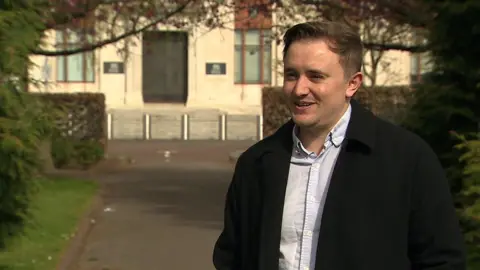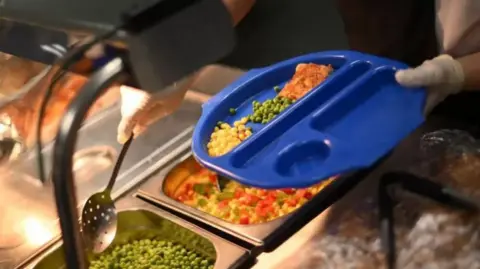Is a hard winter coming for Welsh public services?
 Getty Images
Getty ImagesOctober: the start of autumn proper, when the first chills of the coming winter begin to descend.
But in the current political climate it isn't just the temperature that might make you shudder.
This month we find out where the Welsh government will make up to £900m of savings.
Finance Minister Rebecca Evans is due to make an announcement in the Senedd.
It is a huge figure, roughly 5% of the government's entire annual budget, and the decisions could have a huge impact on the services you and I use every day.
First Minister Mark Drakeford confirmed the scale of the problem in a written statement to the Senedd in August, describing it as the toughest financial situation since the start of devolution. Ministers have spent the weeks since working out what to do.
Although it raises some money through taxes, the bulk of the Welsh government's roughly £20bn annual budget comes via a block grant from Westminster. It argues the value of that grant has been eroded by inflation.
Where did the shortfall come from?
It's not that the Welsh government has suddenly had £900m taken away from it: it's that the money it had simply won't stretch as far as it had hoped because of the impact of rising prices, or inflation.
It is something we have all experienced at a smaller scale: £50 buys you a lot less at the supermarket than it did two years ago, for example.
 Getty Images
Getty ImagesHigher than bargained-for public sector pay rises for workers like nurses, teachers and civil servants have also had an impact.
The Welsh government has criticised pay awards in England for NHS staff, which have to come from the existing English health budget.
The lack of new, extra cash means no equivalent funding for Wales to pay its own health workers for pay rises of their own.
So is it actually £900m?
Yes, based on the value of what the Welsh government thought it would have at a certain point in time, compared to when its block grant was set by the UK government two years ago. Although - as we'll see below - the figure has been called into question.
Ministers, including the first minister, have also consistently used the phrase "up to" £900m.
So is it £900m?
Well, maybe not. Inflation has been coming down for one thing.
And in August, David Phillips from the respected think-tank the Institute for Fiscal Studies said it "was probably not as much as £900m, but higher than expected".
He said the Welsh government had used the consumer price index measure of inflation - there is more than one way to measure it - which can overstate the impact of rising costs on government.
Guto Ifan, a public finances expert at Cardiff University, also pointed out it that was difficult to gauge precisely the impact of inflation. He believes those public sector pay awards have definitely had an impact.
Then there was this comment from Finance Minister Rebecca Evans in the Senedd on 14 September: "Just to reassure colleagues, I'm not looking for £900m to be reprioritised across government, we're looking at what else we can do. We have to consider assumptions around, for example, NHS pay consequentials."
She added that ministers were looking at where spending could be "delayed, deferred, reprioritised and reduced".

What's it mean for Welsh government finances?
Well, if the UK government decides to provide extra cash for NHS pay in England then an equivalent amount of money, roughly 5% based on population, would come to Wales - using the Barnett formula.
Following a meeting between Ms Evans and the UK government's chief secretary to the Treasury, the week before last, that might not now happen, if at all, until the new year.
The amount is not likely to be game-changing, but every little helps.
There might also be some relief in the chancellor's Autumn Statement in November. Again, any new money for something in England should mean an equivalent amount for Wales.
All this has led to calls from Plaid Cymru for clarity and transparency.
Plaid also says the Welsh government should take some responsibility for its own budget-setting process.
There have been, for many people, legitimate questions over whether Welsh ministers should have spotted this problem sooner, and acted more quickly.
The draft budget was set last December and approved by the Senedd in March, at a time when inflation was extremely high.
Welsh Conservatives have repeatedly described the Welsh government's allocation from Westminster as a "record" settlement.
They also want the health budget ring-fenced and have criticised "vanity projects" such as the new 20mph law and plans to expand the Senedd.
 Getty Images
Getty ImagesThe Conservative UK government agrees saying: "The Welsh government is currently receiving the largest funding settlement in the history of devolution."
At time of writing we do not know where the cuts will come, although ministers have been drawing up impact assessments of what they've been discussing so far.
Free school meals in the summer holidays (cost £15m) and a Covid monitoring scheme using sewage (cost £4m) have already felt the pinch and were scrapped.
But Ms Evans has confirmed that the Revenue Support Grant, which funds local councils, is "protected".
And one of the Welsh government's senior budget officials told the Senedd's Finance Committee that the "emphasis" was on "protecting core frontline public services" and "households who are most hit by some of the cost of living challenges".

- BINGE-WORTHY BOX SETS: Everyone is talking about these award-winning dramas...
- WYNNE'S WELSH 70S: Nostalgia and footage from Wynne Evans' favourite decade

